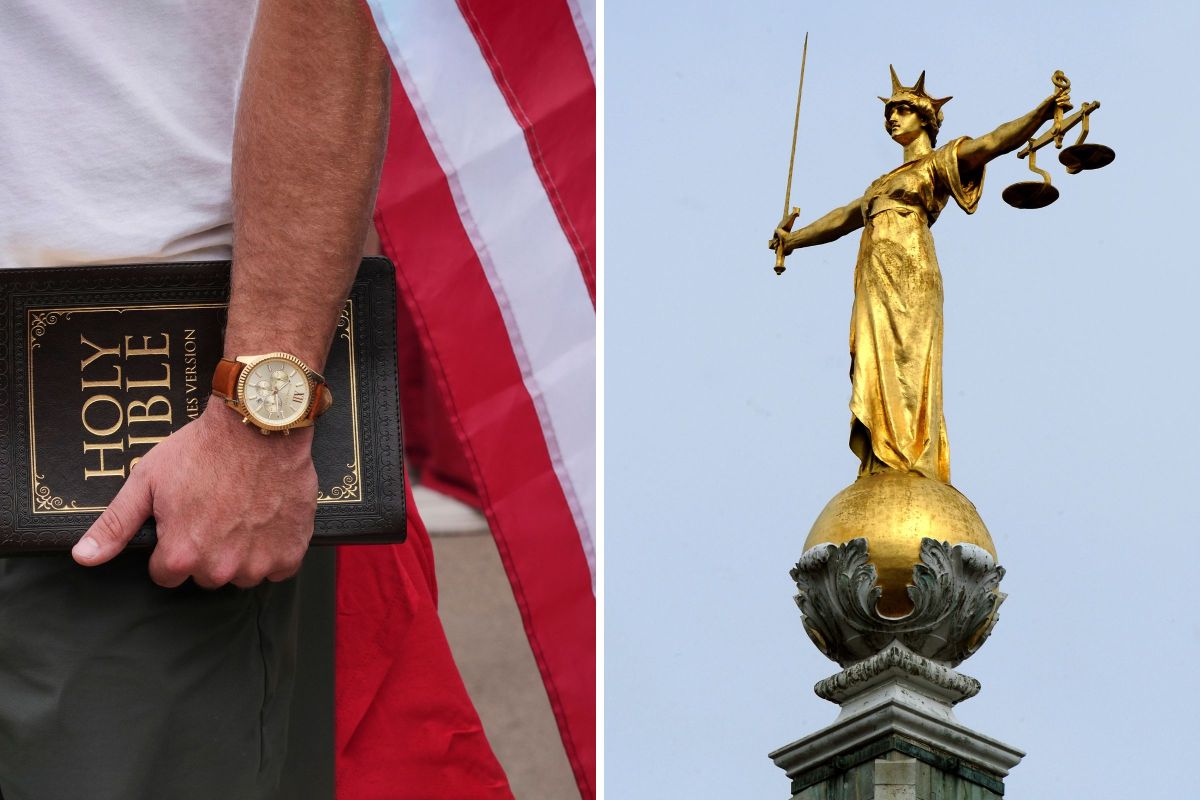Top Stories
Maine Supreme Court Weighs Mom’s Right to Take Daughter to Church

UPDATE: The Maine Supreme Judicial Court is currently deliberating a groundbreaking case that could redefine parental rights and religious freedoms in custody disputes. In a dramatic turn of events, the court is examining whether a lower court overstepped its bounds by prohibiting a mother from taking her 12-year-old daughter to church and exposing her to Bible teachings.
This case, known as Bickford v. Bradeen, has garnered national attention due to its sweeping implications for family law. The stakes are high as the court seeks to balance constitutional rights against concerns of potential psychological harm to the child.
At the heart of the matter is a December 13, 2024 custody order from the Portland District Court. The ruling granted the child’s father, Matthew Bradeen, exclusive control over all religious decisions, thereby restricting Emily Bickford, the child’s mother, from engaging in any religious education or activities with her daughter. This order arose after the court found that teachings from Calvary Chapel, the church Bickford attended, had caused psychological distress to the child.
During oral arguments on November 13, 2025, Bickford’s attorney, Mathew Staver, argued that the restrictions imposed on Bickford were unconstitutional, labeling them a “total veto” on her religious practices. He emphasized that the court’s findings lacked sufficient evidence of abuse or neglect, merely citing instances of anxiety and fear from the child. Staver asserted, “That cannot be a compelling interest,” questioning the broad authority granted to Bradeen over their daughter’s religious upbringing.
On the opposing side, Bradeen’s attorney, Michelle King, defended the lower court’s decision, asserting that the judge identified “compelling state interests” in protecting the child from substantial harm. King claimed that the court had appropriately tailored its restrictions based on credible expert testimony regarding the psychological effects of the church’s teachings.
As the justices delve deeper into the implications of this case, they are questioning how far courts can go in regulating religious practices in custody battles. One justice highlighted the potential conflict between the “best interest of the child” standard and principles of religious freedom, raising critical concerns about where the boundary lies in cases alleging harmful religious practices.
The Maine Supreme Judicial Court’s ruling will hold significant weight, potentially setting a precedent for how courts nationally handle issues of parental rights against claims of psychological harm. The decision could clarify the extent to which judges can scrutinize religious teachings and practices in custody disputes.
WHAT’S NEXT: The court is now in deliberation, with a decision expected in the coming months that could reshape family law in Maine and beyond. The outcome may either uphold the lower court’s order, reverse it, or mandate further proceedings, impacting countless families navigating similar issues.
As this case unfolds, it remains a critical touchpoint in the ongoing dialogue about the intersection of parental rights, religious freedom, and child welfare, raising questions that resonate far beyond the state of Maine. The urgency of this issue continues to capture public interest, with many eager to see how the court will navigate these complex waters.
-

 Science4 weeks ago
Science4 weeks agoInventor Achieves Breakthrough with 2 Billion FPS Laser Video
-

 Health1 month ago
Health1 month agoCommunity Unites for 7th Annual Into the Light Walk for Mental Health
-

 Top Stories1 month ago
Top Stories1 month agoCharlie Sheen’s New Romance: ‘Glowing’ with Younger Partner
-

 Entertainment1 month ago
Entertainment1 month agoDua Lipa Aces GCSE Spanish, Sparks Super Bowl Buzz with Fans
-

 Entertainment1 month ago
Entertainment1 month agoMother Fights to Reunite with Children After Kidnapping in New Drama
-

 Business1 month ago
Business1 month agoTyler Technologies Set to Reveal Q3 Earnings on October 22
-

 World1 month ago
World1 month agoR&B Icon D’Angelo Dies at 51, Leaving Lasting Legacy
-

 Health1 month ago
Health1 month agoCurium Group, PeptiDream, and PDRadiopharma Launch Key Cancer Trial
-

 Entertainment1 month ago
Entertainment1 month agoRed Sox’s Bregman to Become Free Agent; Tigers Commit to Skubal
-

 Health1 month ago
Health1 month agoNorth Carolina’s Biotech Boom: Billions in New Investments
-

 Science1 month ago
Science1 month agoNorth Carolina’s Biotech Boom: Billions Invested in Manufacturing
-

 Top Stories1 month ago
Top Stories1 month agoFormer Mozilla CMO Launches AI-Driven Cannabis Cocktail Brand Fast









